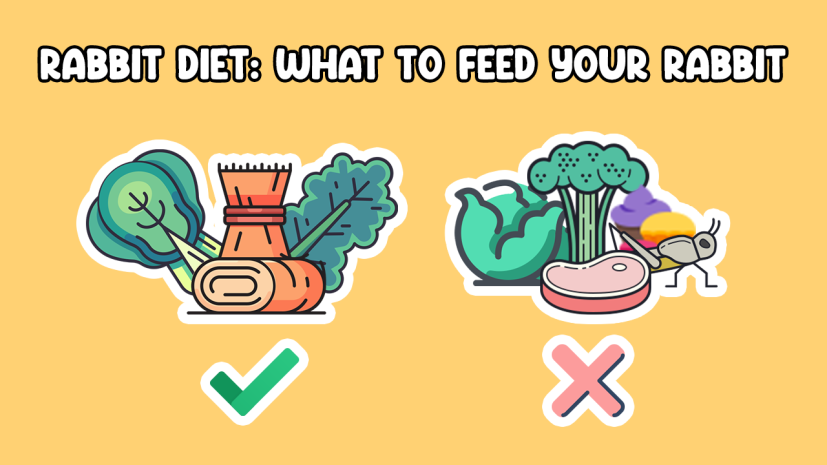
Rabbits are very fragile creatures with very sensitive gut systems. Despite what you see in movies and television, Rabbits need a lot more in their diet than a few pellets, carrots, and some lettuce. This post will discuss the best way to keep your rabbit on a healthy diet.

This is Chapter 3 of The Beginner’s Guide to Rabbit Care
A rabbit’s diet should consist of Timothy Hay, a quarter to half a cup of fortified pellets, and 1-3 cups of fresh leafy green vegetables daily. You can give your rabbit treats, but this should be kept to a minimum.
When introducing new food to your furry friend, you need to make sure that you’re easing them into it, this means smaller portions day by day until their digestion tract can handle whatever you put in their fruit and vegetable bowl.
Like all animals, rabbits require a balanced and nutritious diet to maintain good health. A proper diet can help prevent obesity, dental problems, digestive issues, and other health problems that can significantly affect a rabbit’s quality of life.
Therefore, it is important to ensure that your bunny is getting the right nutrients in the right amounts.
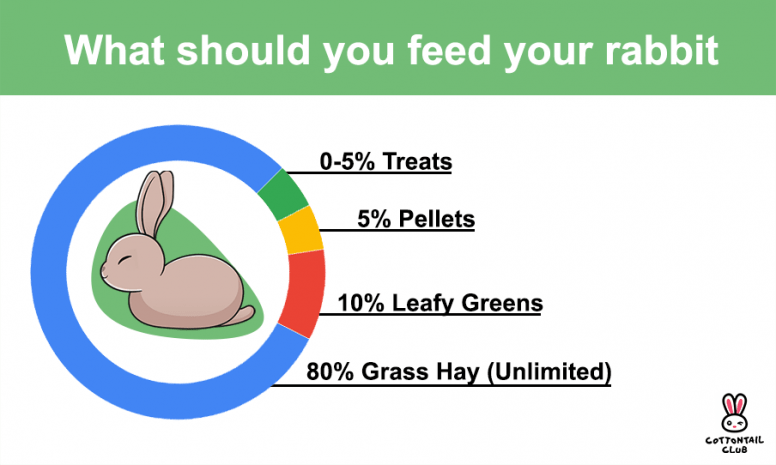
Please note that a rabbit younger than six months will have an entirely different diet and should be followed strictly. Read our post on what to feed a baby rabbit.
The most significant part of a rabbit’s diet is to provide them with constant access to grass-based hay. Fiber and protein found in grass hays are essential to helping your rabbit regulate its digestive system and gut flow. Grass hay is simply a different type of dried grass.
You should give your rabbit unlimited quantities of grass hay and ensure they always have access to grazing some grass hay.
In total, your rabbit’s diet should consist of 80% hay, this helps keep their gut balanced and consistently digesting and moving; additionally, hay is incredibly useful for dental health and keeping their incisors worn down.
There are many types of hay that you can give your rabbit, we suggest timothy hay, but it’s also worth testing other types such as Bluegrass, Fescue, Herbal, Marsh, Meadow, Oat, Orchard & Ryegrass.
Due to your rabbit’s ancestral history, foraging is a large part of how their digestive tract will break down fiber from vegetation. We recommend going for the longer fiber you see, almost like straws. Those will be much better quality and have much more fiber content than any ground-up hay or pellets.
Your rabbit’s teeth are crucial to keeping them healthy. They will continually keep growing and if not worn down will need trimming.
Overgrown rabbit teeth can cause a wide range of issues, from an inability to chew to pain and comfort issues, all of which can lead to GI Stasis.
Along with hay, we recommend some wooden chew toys and willow/apple sticks, as these are rough and can be chewed for a long time.
Every rabbit will have their own preference on which type of hay they want, this can change based on seasons, environments, and even how often they have this hay.
However, one hay we suggest you avoid giving adult rabbits is Alfalfa Hay, as it’s not grass-based hay. With excess calcium and protein, Alfalfa hay can cause bladder stones and a thick substance called Bladder Sludge.
If you’re raising Baby Rabbits (kits) or have underweight adult rabbits, Alfalfa hay is applicable as it provides the required nutrients for growth and improving weight and strength.
Rabbit Pellets are an additional meal that makes up a small part of your rabbit’s diet. In theory, you shouldn’t need to add pellets to your rabbit’s diet as long as they have access to unlimited hay, however, pellets will contain extra nutrients that help keep your rabbit healthy.
Whilst we suggest giving a maximum of 5% of their diet as pellets, this can vary based on the size of your rabbit. Larger rabbits will need a higher amount of pellets each day, we have a table and downloadable rabbit diet chart here:
| Rabbit Weight | Daily Pellet count |
|---|---|
| 2lbs / 0.9kg | 2 Tablespoons |
| 3lbs / 1.3kg | 3 Tablespoons |
| 4lbs / 1.8kg | 4 Tablespoons / ¼ Cup |
| 5lbs / 2.2kg | 5 Tablespoons |
| 6lbs / 2.7kg | 6 Tablespoons |
| 7lbs / 3.2kg | 7 Tablespoons |
| 8lbs / 3.6kg | 8 Tablespoons / ½ Cup |
| 9lbs / 4kg | 9 Tablespoons |
| 10lbs / 4.5 | 10 Tablespoons |
Rabbit Pellets are designed to give your rabbit nutrients in a smaller concentrated form, when looking for pellets, you should look for 18%+ Fiber, 14% Protein, and 3% or less in Fat contents.
Most rabbits will love their pellets and have a preferred brand. However, much like hay, different types provide different nutritional values.
We have done a deep dive into the best rabbit pellets, which should help you find a brand that best meets your rabbit’s needs. However, there are a few rules we recommend following:
If you are introducing new foods into your rabbit’s diet, make sure they have a lot of fresh hay available to help regulate their stomach balance. The same can be said for changing a rabbit’s diet, try to do this as little as possible, as it can upset their digestive system.
The amount of pellets you should feed your rabbit depends on their age, weight, and activity level. In general, adult rabbits should have access to unlimited hay and fresh water, along with a limited amount of pellets.
Our calculator uses a formula of 25g of pellets per kg of your rabbit’s body weight to ensure your furry friend receives the proper nutrition.
For example, Holland Lops weigh between 1.4-2kg on average. This means they should have around 35g of pellets per day, which is around 1/3 cup.
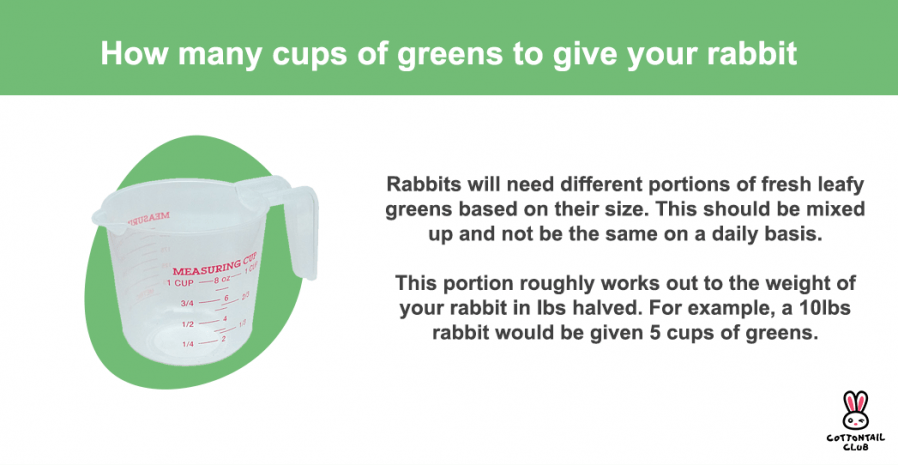
Your rabbit should be given around 10% of their daily diet in Fresh leafy greens. This is due to the nutritional value being extremely high. Whilst some rabbits are quite picky, there are usually some leafy greens your rabbit will have as a favorite that can be added to their diet.
We recommend trying to mix the types of greens as much as possible, as this provides a wide range of nutritional value. We recommend giving your rabbit at least 3-4 different greens to avoid poisoning from excessive nutritional intake.
As different breeds are different sizes, giving them the right portion of vegetables can be difficult to weigh up, however, if you get yourself a measuring cup, you can ensure they’re receiving the right quantity of leafy greens by following this table:
| Rabbit Weight | Amount of greens (Cups) |
|---|---|
| 2lbs / 0.9kg | 1 cup |
| 3lbs / 1.3kg | 1.5 cups |
| 4lbs / 1.8kg | 2 cups |
| 5lbs / 2.2kg | 2.5 cups |
| 6lbs / 2.7kg | 3 cups |
| 7lbs / 3.2kg | 3.5 cups |
| 8lbs / 3.6kg | 4 cups |
| 9lbs / 4kg | 4.5 cups |
| 10lbs / 4.5 | 5 cups |
Your rabbit’s diet will likely change as they get older, this isn’t something you should worry too much about and can be planned in advance by having regular checkups at an exotic Veterinary. You will still need to constantly feed them hay, greens, a small portion of pellets, and some leafy greens.
As your rabbit gets older, it may struggle with chewing. As such, we recommend keeping portions small and easy to chew on to avoid choking.
Your rabbit should be eating leafy greens on a regular basis, but you should not be giving them the same greens every day. Giving your rabbit the same greens may result in poisoning and gut issues due to giving them too much of one specific nutrient. We recommend not giving your rabbit iceberg lettuce and sticking only to the safe lettuce leaves.
Unfortunately, iceberg lettuce contains lactucarium which can stop your rabbit’s GI Tract from operating properly.
| Arugula | Yes | Mint | Yes |
| Basil | Yes | Mustard Greens | Small Quantities |
| Beet Greens | Small Quantities | Napa Cabbage | Yes |
| Bok Choy | Yes | Oregano | Yes |
| Broccoli Leaves | Yes | Parsley | Small Quantities |
| Butter Lettuce | Yes | Peppermint | Yes |
| Cabbage | Yes | Potato Tops | No |
| Carrot Tops | Yes | Radicchio | Yes |
| Chard | Small Quantities | Radish Greens | Small Quantities |
| Cilantro | Yes | Ragwort | No |
| Collard Greens | Yes | Raspberry Leaves | Yes |
| Coriander | Yes | Red Cabbage | Yes |
| Cucumber Leaves | Yes | Rhubarb Leaves | No |
| Dandelion Greens | Yes | Romaine Lettuce | Yes |
| Dill | Yes | Rosemary | Yes |
| Endive | Yes | Sage | Yes |
| Escarole | Yes | Silverbeet | No |
| Fig Leaves | Yes | Spinach | Small Quantities |
| Frisee Lettuce | Yes | Spring Greens | Yes |
| Green Leafy Lettuce | Yes | Sprouts | Small Quantities |
| Iceberg Lettuce | No | Thyme | Yes |
| Jicama | No | Turnip Greens | Yes |
| Kale | Small Quantities | Watercress | Yes |
| Lemongrass | Yes | Wheatgrass | Yes |
| Mallow | Yes | Yu Choy | Yes |
Much like ourselves, rabbits love sugar. Anything sweet will kick start their excitement, this is anything from Strawberries to hay forage & even oats are a fantastic way to not only add weight to your rabbit but also give them some enrichment.
We’ve recommended dried fruit in the past and still do to this day. However, fresh fruit can be a great way of getting some extra fluid into your rabbit and help hydrate them in the summer period or in hot climates.

We recommend pellets as the best treat to avoid extra sugar consumption. Also, dry oats can be given, but these are usually used for weight gain, not a treat. Typically, you would want to give a rabbit that weighs 2lbs a maximum of 2 teaspoons of treats and a rabbit at 10lbs 3 Tablespoons and 1 teaspoon.
Not sure how many treats to give your rabbit at a maximum? Check out our treat-to-weight ratio table:
| Rabbit Weight | Maximum daily treats |
|---|---|
| 2lbs / 0.9kg | 1 Teaspoon |
| 3lbs / 1.3kg | 1 Tablespoon |
| 4lbs / 1.8kg | 1 Tablespoon & 1 Teaspoon |
| 5lbs / 2.2kg | 1 Tablespoon & 2 Teaspoon |
| 6lbs / 2.7kg | 2 Tablespoon |
| 7lbs / 3.2kg | 2 Tablespoon & 1 Teaspoon |
| 8lbs / 3.6kg | 2 Tablespoon & 2 Teaspoon |
| 9lbs / 4kg | 3 Tablespoon |
| 10lbs / 4.5 | 3 Tablespoon & 1 Teaspoon |
| Treat | Can Eat? | Treat | Can Eat? |
|---|---|---|---|
| Acorns | No | Kiwi | Yes |
| Almonds | No | Kohlrabi | Yes |
| Apple Seeds | No | Leeks | No |
| Apples | Yes | Lemon Peels | Yes |
| Apricots | Yes | Lemons | Yes |
| Artichoke Leaves | No | Lentils | No |
| Asparagus | Yes | Mandarins | Yes |
| Avocado | No | Mango | Yes |
| Baby Sweetcorn | Yes | Milk | No |
| Bananas | Yes | Mushrooms | No |
| Bean Sprouts | Yes | Nectarines | Yes |
| Beans | No | Noodles | No |
| Beet Greens | Yes | Nuts | No |
| Beetroot | Yes | Oatmeal | Yes |
| Beets | Yes | Okra | Yes |
| Bell Peppers | Yes | Olives | No |
| Blackberries | Yes | Onions | No |
| Blueberries | Yes | Oranges | Yes |
| Bread | No | Orange Peels | Yes |
| Broccoli | Yes | Papaya | Yes |
| Brussel Sprouts | Yes | All Kinds of pasta | No |
| Candy / Sweets | No | Peaches | Yes |
| Cantaloupe | Yes | Peanut Butter | No |
| Carrots | Yes | Peanuts | No |
| Cauliflower | Yes | Pears | Yes |
| Celery | Yes | Pineapple | Yes |
| Celery Leaves | Yes | Pinecones | Yes |
| Cereal | No | Plums | Yes |
| Cheese | No | Popcorn | No |
| Cherries | Yes | Potatoes | No |
| Chocolate | No | Pumpkin | Yes |
| Coffee | No | Pumpkin Seeds | Yes |
| Corn | No | Quinoa | No |
| Corn Husks | No | Radish | Yes |
| Crackers | No | Raisins | Yes |
| Cranberries | Yes | Raspberries | Yes |
| Cucumbers | Yes | Rhubarb | No |
| Currants | No | Rice | No |
| Dates | No | Seeds | No |
| Dragon Fruit | Yes | Silverbeet | No |
| Edamame | No | Snap Peas | Yes |
| Eggplant | Yes | Squash | Yes |
| Eggs | No | Star Fruit | Yes |
| Elderberry | Yes | Strawberries & Tops | Yes |
| Fennel | Yes | White & Brown Sugar | No |
| Figs | No | Summer Squash | Yes |
| Garlic | No | Sunflower Seeds** | Yes |
| Grapefruit | Yes | Sweet Potatoes* | No |
| Grapefruit Peel | Yes | Tomato Leaves | No |
| Grapes | Yes | Tomatoes | Yes |
| Green Beans | Yes | Turnips | Yes |
| Green Onions | No | Walnuts | No |
| Honey | No | Watermelon | Yes |
| Honeydew | Yes | Yogurt | No |
| Hot Peppers | No | Yogurt Treats | No |
| Ice | Yes | Zucchini | Yes |
| Jute Twine | Yes | ||
| Kelp | No |
With many places offering “Rabbit Safe” treats which contain products your rabbit shouldn’t be eating, it’s becoming increasingly hard to know who and what you can trust.
That’s why we’ve curated a list of pet treats you can order online, which have been overseen by an individual with a National Diploma in Animal Management, you can check out our treat recommendations.
The unfortunate truth here is that rabbits aren’t particularly good at self-discipline. Much like ourselves, we are subject to addiction and wanting more of something that’s good. If your rabbit is begging & is already on a great and balanced diet, the best solution is to distract them with something else.
Rabbits cannot be disciplined in the same way a dog can, they are not responsive to physical discipline and, in most instances, will ignore vocal discipline. The best solution to this is to ignore their begging or bad behavior and play with them.
Much like hay, rabbits should have unlimited access to fresh water. You will want to empty and fill up your rabbit’s bowl every day as this helps avoid mold and algae. You can use tap water. However, we recommend filtered/purified water if possible.
Your rabbit will drink around 1-2 cups of water per day, usually more during the summer or in a hot climate. We will often add ice to our rabbit’s water all year round as this helps keep the water tasting fresher and cool.
When giving your rabbit their fresh greens, washing them with water first can help add extra hydration to your rabbit’s diet. Greens will also contain their own water.
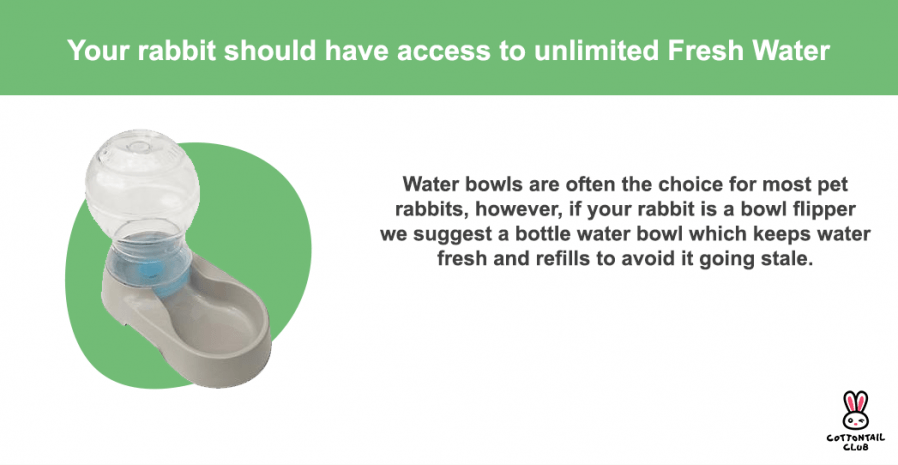
You will often see within varying rabbit communities that a water bowl is an optimal choice for keeping your rabbit hydrated, the biggest concern with this choice is that your rabbit may love to throw their bowl away.
Having a heavy ceramic bowl is a great option to avoid your rabbit throwing or flipping their bowl, these can be picked up on Amazon or from your local pet shop.
Unfortunately, with an open bowl, you will likely have instances where pellets, poop, toys, and even bedding are kicked into it. A simple water change is often all that’s needed. But this can be a leading reason why people move to water bottles.
Water bottles also have their pros and cons. Bottles are notoriously known for being harder to drink from and have occasionally had instances where the ball inside has become jammed and has resulted in dehydration.
We use a bottle that feeds into a bowl. This lets us put ice into the bottle during the summer, keeping water fresh and topped up.
This comes with no wires or risks and cannot be tipped over. We recommend the Water Bubble Gray Pet Waterer as it gets the job done and is very easy to clean and use.
Your rabbit will inevitably chew or eat something it shouldn’t. In most cases, this isn’t a problem despite their extremely sensitive stomachs. Whilst it won’t do harm if your rabbit eats a bit of paper, a few things require you to call your veterinarian as soon as possible.
Avocados are a great source of natural fats for humans, but they contain toxic compounds to your rabbit. This toxin is called Persin, which is found in the entirety of the avocado. Persin can cause a variety of issues that lead to congestive heart failure and death, alongside changes in behavior and breathing.
Other than Sunflower seeds, your rabbit should not have any seeds as they contain small amounts of Cyanide. Whilst the quantities are extremely small, it’s still not worth risking it.
Vegetables that are part of the Allium family contain a toxic oxidant called n-propyl disulfide which can cause oxidative damage to your rabbit. This process results in your red blood cells trying to destroy themselves and can lead to hemolytic anemia.
Symptoms of hemolytic anemia in rabbits include stumbling, disinterest in food, treats, and water, lethargic behavior, and pale gums around the teeth.
As rabbits aren’t carnivores, their guts aren’t designed to digest animal proteins and fats, which can result in kidney stones & urinary tract infections. Whilst meat isn’t poisonous, you should avoid giving your rabbit dog, and cat food
Dairy products should be avoided as they contain Lacto Bacteria (Lactobacillus) which your rabbit’s gut and intestinal tract cannot dissolve properly with their stomach acid. This means products such as cow’s milk and yogurt drops should not be given to your rabbit.
Baby rabbits can have KMR and in some cases goat’s milk, but adult rabbits should not consume dairy.
Much like dairy, eggs may be extremely high in protein, but they can cause your rabbit to get extremely sick due to developing hypercholesterolemia, their cholesterol levels will increase from 15 to up to 30.
Rhubarb is extremely toxic to rabbits due to the amounts of oxalic acid they contain, this can result in a multitude of issues, one of the most severe being acid poisoning that can cause acute renal failure and kidney failure.
Whilst rabbits can eat lettuce, however, iceberg lettuce should be avoided entirely as it contains a toxin called Lactucarium. The quantity of Lactucarium in a single lettuce leaf likely won’t cause problems, however, a large quantity and long-term eating will lead to severe health problems.
Depending on the type of mushroom, they can contain mycotoxins which can cause diarrhea, gastrointestinal problems, neurological issues, and organ damage. Due to this, it’s worth making sure there are no mushrooms in your garden, regardless of how normal they look.
This area of foods is a bit large, but to specify a little further, this is anything along the lines of Chips, French Fries, Chocolate, Cookies & Candy. If it’s filled with sugar or artificial ingredients it will cause your rabbit’s digestive system to block up due to not being able to digest quickly enough or at all. If your rabbit’s gut does slow down or stop, this can lead to GI Stasis and even death.
Potatoes in small quantities don’t typically result in any form of poisoning. However, due to their high carbohydrate and starch levels, they can slow down your rabbit’s digestive tract leading to GI Stasis. Symptoms of your rabbit eating potatoes include:
If your rabbit eats a sprouted potato (The little bumps that grow on the top of a potato), that may cause extreme issues as those little stems are highly toxic and can result in a quick death.
A Wild Rabbit Diet and a domestic rabbit’s diet are similar, but their diets can differ based on their environment and food availability. In the wild, rabbits primarily eat grasses, hay, and other plant materials. They also consume small amounts of fruits and vegetables when they are available.
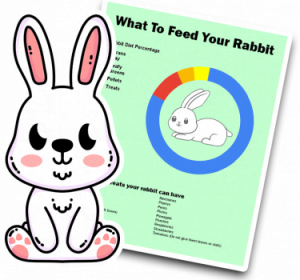
By entering your email address you agree to receive emails from Cottontailclub. We'll respect your privacy and you can unsubscribe at any time.